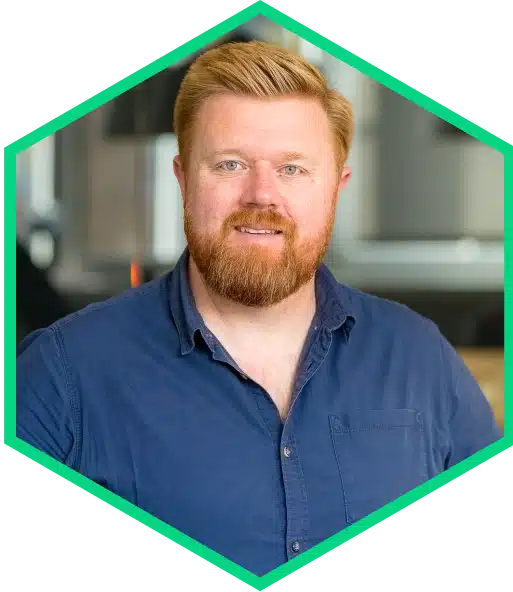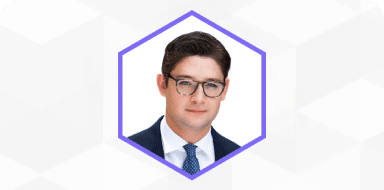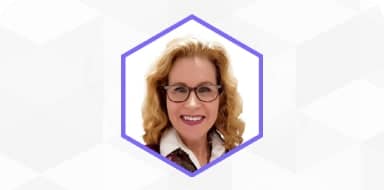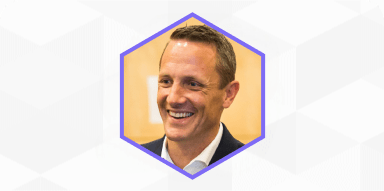Transcript
00:13 Rob Savitsky:
Welcome back to another episode of Conversations on the Creek. The Duck Creek podcast where we interview thought leaders about how the latest InsurTech is transforming the P&C insurance industry. Whether you work in underwriting, sales and marketing, claims, or an insurance IT department, in each episode, we uncover the insights you need to reimagine the future of insurance.
I’m Rob Savitsky. In today’s episode, we’re so pumped to be joined by Oliver Werneyer, founder of Imburse and VP of Product Strategy at Duck Creek. We share his story about the founding of Imburse, discuss how insurance can streamline payments across the customer lifecycle, and describe the path ahead since the acquisition by Duck Creek. If you don’t know Imburse, Imburse’s mission is to simplify the way businesses around the world access the global payment ecosystem. All of our welcome to the show and welcome to our Formation’23!
00:58 Olivier Werneyer:
Awesome. Now, thanks for having me. It’s great to be here. It’s a pumping environment. Also happy to be on the podcast and share more.
01:05 Rob:
Yeah, great to have you here. I hope your— Your session, I missed it earlier, just a few moments ago. How did that go for you?
01:11 Oliver:
That was awesome. It was a packed house. Like, that’s always great to see, and a lot of interest in the payments topic, a lot of pain points that people struggle with on a day-to-day basis, and it’s a great, like, affirmation for, like, we’re targeting the right problem. We’re solving the right problem. And people need that problem solved. And I look forward to sharing a bit more about that. But it’s a great session.
01:30 Rob:
Awesome. Well, a couple months ago, I did an episode about the founding of Duck Creek with Andy Yohn, and obviously Imburse got a reference in that; It’s part of the story. But now, this is kind of like the side story. I think we you know, it’s worth— before we talk about payments, get a little bit about, you know, where did you come from? Who is Oliver? And how did you get to founding Imburse?
01:52 Oliver:
Yup. My story, I’m South African, actually. So, I’m originally born and grew up in South Africa in a German household, to make things nice and complicated. And actually, it’s at school there where I met one of my co-founders. Carl was a CFO. And long story short, we ended up in the UK. Both of us sort of working there for large corporates. And we actually traveled a lot for our corporate career; always hanging out in airports, waiting at those boards, waiting— which gates we’re going to depart from;
It was super frustrating, and Carl and I said, “There has to be a better way than planes can’t know 40 minutes before which gate they’re going to park at”. So, we said no. We created a flight tracking app just for us using flight sets data, and our colleagues were like, “Oh, we also want access to that.” So, we put it on the app store for them to download easily.
And not a month later, we get a bill from FlightStats for like 800 pounds. They’re like- I was like, “What’s this for?” They’re like, “Yeah, it’s for all the people tracking flights.” I was like, “How’s 40 people like us and our colleagues tracking flight that expensive?” They’re like, “You mean 20,000 people.”
02:50 Rob:
Wow, 20,000?
02:50 Oliver:
So, people just started downloading from the App Store. Like we didn’t know marketing or anything. But turns out we were one of the first flight tracking apps there. And before we knew it, we were like 100,000 downloads, money is costing so we had to decide, “Are we going to make a business out of it or shut it down?” And we said, “Come on, let’s give this a go. We made it to flight tracking app trying to sell flight delay insurance”.
And at that point, we were working with a carrier in the US for the product. And they said, “Man, you know, we can give you the product, but we can’t do real-time payments”. And the clients were like, “Well, if you can’t do real time payments, what the hell’s the money going to help me, like two days down the line? So then no, I don’t need the product”.
And then the carrier was like, “Well, guys, like I know real time payments exist as a tech in the market. But that’s not connected to our system. That’s a million-dollar IT project. It’s going to take us like 15 months. We’re not going to do it for this. So, figure out a way to connect this payment tech to our systems without touching our core IT. Yeah, maybe then we have a deal.”
So, we actually built something in three months that we thought was going to be temporary. Three months later, we’re back at the carrier, telling them how we’re going to do it. And they’re like, “Oh, that’s pretty awesome. So, can you sell us that tech? Because you did it in three months when we couldn’t do in 15 months for million dollars”. I’m like, what? And we realize actually, there’s a great big market there and we started to understand the problem was integration or choice.
We checked it with several insurers. We’re like, “Hey, there’s a business here”. And we did whatever startup does, and the startup story did a pivot, boom, we had started Imburse, Feb 2018. Really grew a lot, we’re like solving a lot of payment problems in the carrier’s world.
And we got to meet Duck Creek through all of that, like as a partner, they were super convinced by what we’re doing, saying, “It’s really awesome stuff. We really liked the teams,” and now we’re part of the, you know, part of the flock and it’s really exciting. I have to say.
04:31 Rob:
That’s awesome. So, you started off doing something you had no intention of doing with this flight tracking app, and you went in a completely different direction. I’m curious. What was the team like that you surrounded yourself to build that? Because I think— and maybe you skipped over this, but you have an insurance background, right?
04:46 Oliver:
Yup. Exactly. So, there were four founders of us. And you know, I just couldn’t have wished for better founders. So, with me was the person I knew from school who was our CFO, Carl Stremple. And then he brought in like— We needed some technical people to help us as founders because neither Carl nor I are programmers, like as you mentioned, mine was insurance background for my— Since I’m from the actuarial side of the world, and Carl is from the financial side. So, Chartered Financial Accountant.
And then we brought on two technical founders, David Scott Turner, and Mark Jerome. And we formed a really great team at the beginning, bringing both the business side as well as the technology side. And I think, if I had to look back, I think that was one of the keys to our success. It’s that we didn’t just build tech for the sake of building tech, we built a good business.
And that was really important in this mix; like half tech, half not-tech, and just grew the team with awesome people from there. One of our first hires, Bruno, who’s our Chief Product Officer, did incredible things for the platform.
We had an amazing HR lady Helen, you know, she’s just incredible for the culture piece, Michael Sharp, just getting the growth team in place. So, surrounding yourself with awesome people is one of the big rewards of building your own company.
06:00 Rob:
That’s awesome. Awesome. Yeah, no, I like to go a little bit more into some of the challenges within payments. So, you mentioned and you know, for some of our listeners, not everyone necessarily, is heads down in the payment space.
We’ve got folks in IT, who certainly need to understand the landscape and so forth. But can you break down a little bit more— the problem in more granular detail that you were you were looking to connect? And maybe, you know, shed some light on the fragmentation across the payments ecosystem?
06:24 Oliver:
Yeah. So, I think it’s all rooted in the fact that the insurance industry is somewhat behind what customers expect from the day-to-day engagements or on payments. And these expectations are set by retailers, streaming like Amazon, Netflix, Airbnb, like seamless, easy, you know, card, digital, quick— The fact that you know— and that it’s hard to do payments, that the customer doesn’t care, right?
The fact that there’s this super complexity within the insurance environment, old IT systems, no specific knowledge around payments, yet it’s an exchange of payments, focuses on the processes to get to claims decision.
And this desire for the industry, the insurance industry to catch up to good customer experience, and customer images— We sorted that out in the presentations earlier, humanized— you know, humanize the experience.
07:16 Rob:
Right.
07:17 Oliver:
This requires getting down to the customer level, and giving them what they want. So, personalization. Humanization. But that blowback is immense from an operational perspective onto an insurer. Just by choosing between like a bank or like an ACH, or backs or CIPA. And card, and Venmo, like a wallet type.
That’s often three different providers. Within a carrier, somebody has to do that integration, see if it’s even possible because some of the systems are so old. Then you have to integrate that into finance world, to the reporting. These payment types all work differently. Like how long it takes to get the money, when it’s in your bank account, the reports that come back, what if there’s an issue? Who do you go to?
07:57 Rob:
Right.
07:58 Oliver:
So, this problem is not only difficult, because it’s not a core competency of an insurer, although it’s mission critical. Once you’re in an insurer, a different line of business will want a different customer journey, they want a different provider. Going into another country, everything changed again. So this complexity, just exponentially gets worse, and for insurers, that means expensive. And this is where it breaks down.
So, they’re struggling to catch up to giving a great customer experience, automating process, because to appoint any of this… It’s super expensive, and takes super long. And this is where we’ve just realized we can make a difference. Like breaking down that piece, making it easy to deploy, getting payments, you know, the day-to-day customer. For them it’s just like, “Oh, I just want to do what I what I normally do.”
08:44 Rob:
Right.
08:45 Oliver:
And this is what we want to give them, and bridge that between this operational chaos that’s within carriers.
08:50 Rob:
Right. I mean, for the customer. It’s like, you know, first of all, we’re talking on the personal side, most people don’t think about insurance, don’t want to think about insurance necessarily. But there’s a chance to change that, and part of that is just giving a better experience throughout their lifecycle so…
09:04 Oliver:
And like you said, like, never mind carriers or IT people not understanding payments. End consumer— like why can Apple do it? Why can Netflix do it? Airbnb, those— Seems easy. You know, the excuse about your IT environment and regulation doesn’t interest the end consumer. He wants an experience.
09:23 Rob:
Right? They want to pay their monthly bills, they want to get their claims payouts. So, let’s change gears a little bit. Talk a little bit about some of the current events that have happened. So, March of this year Silicon Valley Bank collapse seized by the FDIC, then in May, just a few days ago, though, probably a little bit later by the time this episode drops, first Republic Bank failed. I’m curious what are some of the lessons learned from insurers that you think we can take away from these events?
09:48 Oliver:
So within the insurance world, people love to think of like one in X year events; Like, so, they even talk about a one-in-200 year event, like, when would a hailstorm of this size or an earthquake happen.
And it’s no different to vendors, like, they look at their banks, like, what is the chance that your bank fails? Like nobody even recognizes that as an actual thing. So I mean, think about an insurer giving a service, and suddenly not being able to collect money. So, even with the Silicon Valley piece, it got locked down. But, it didn’t stop the bank from collecting money. So money was going out of customer accounts, into corporate accounts that were now locked down, that the corporate cannot access.
Now, they don’t have the liquidity to pay for its staff — has no other bank, like what do you do? It’s like an existential question. Now, not everybody banked with Silicon Valley Bank or so. But it really opened their eyes to be like, yeah, this can happen. And we have to start taking this stuff seriously and start thinking about how do we insulate ourselves and protect ourselves against adverse movement. And I think one of these things is just like, some stuff has just become a little bit more real. And they have to digest that now.
So, I don’t know, personally, of any specific carrier that had an existential piece, everything committed to Silicon Valley Bank, but I do know, some startups, in the insurtech and insurance space… We’re pretty much screwed in that space. But you can imagine from a carrier perspective, risk management is major topic at the board level. There’s a lot of questions being asked, just now down into the organization.
Hey, what if our bank goes? Like the fact that it’s a big American bank, or big European bank? People want to know what happens then. And this is open up all the can of worms are on operational, like, why would you have another bank that you might never use, and spend a million bucks to connect and 100k every year just to maintain? So, it’s this whole new world for the carrier’s trying to navigate that and understand what this means for them and their operating model.
11:44 Rob:
Right. And if you decide to go down that, I don’t know if call it diversification or, or other kind of route, I mean, what is the technology in place that you need to have that flexibility to just be able to switch or access.
11:57 Oliver:
So you’ll need some kind of tech layer that allows you to switch out providers or at least aggregate the connectivity into one place, sort of to insulate your organization from having to individually connect. And most companies would today, have to individually connect new providers, this is where a lot of resources go into. It’s just the way it is.
And this is the kind of space we try to focus on. It’s like how do you take this heavy lifting of customers and create sort of this layer for them to put between themselves in that payment world? It’s absolutely critical, but they don’t get, and don’t want to really dedicate too much resources to, because it’s not commercializable, outside of doing the actual work.
12:37 Rob:
Right.
12:38 Oliver:
So a layer like ours, where you can just swap out providers gives you that ability to mitigate this exposure that you have.
12:47 Rob:
Nice. Love that. It sounds like it’s very, very helpful, and a lot of opportunity for carriers to start adopting this kind of tech. So as we get closer to wrapping up here, maybe two more questions. One I want to throw out, if you look— if you look ahead, I like to pull up my crystal ball from time to time; Looking to 2030, from premium collections to claims payments. What opportunities are there do you think we’re, you know, technologies, like Imburse, will have the greatest impact across the insurance lifecycle?
13:15 Oliver:
I think the impact from platform like ours is to enable carriers to use services out there much more, sort of definitively to make a difference in their own lives in the customer, meaning it’s not so much about Imburse, but what Imburse empowers companies to do. Give you a cool example; we started out with a — with a customer who wants to help younger people save more for pension.
So, that was the starting point. And they said, what do we know? People start too late. They don’t save enough at a young age and the products we have are super boring. So, how do we compel them? We know what’s the right thing to do. So, now we have this program called micro savings.
You can subscribe your credit card, set a savings goal like 5% of everything I spend every week. So, save while I spend— not save instead of spending, on a weekly basis. Like oh, you spent $500. 5% of that let me take 25 bucks and put it into your savings account. That made an incredible difference to the average amount saved; It’s much more engaging.
But the cool thing now is that we realize, “Oh crap, you can use that same tech to automate claims payments in the P&C space”. So, when imagine you have a rock into your windshield that got cracked. You claim, great experience, I said got it claim approved, go to the in-network provider, you’re going to pay 20 bucks, we’re going to pay 10 bucks. You know, get yourself sorted out.
Now we realize, hey cool, why don’t we say to the client, you know, use your credit card— Give us your credit card number, and instead then we’ll pay $8.50 And you only have to pay $1.50. Client says that’s a great deal. So, why would the carrier do that? Because—
Goes to the to the repair shop. They fix his car. He pulls his car through the machine, puts his PIN in, pays his $1.50. So it’s done. In that moment, the card skim checks everything.
Is the PIN correct? Is the card blacklisted? Is the person who set it is? Awesome, payment approved. And immediately that’s the same tech as the micro savings, we get a notification, this guy used his card. That’s how much he spent; this is where he spent it. All the checks were fine; PIN, everything. And then the carrier can be like, oh, yeah, that is the name on the card. Cool. The PIN, everything was great. That vendor, like, merchant, that is what a network— Awesome. We pay the $8.50.
Immediately create a bank transaction, pay, it will send them an email: We already paid. So, now that arrives two seconds after the customer pulled the card through. So that vendor — like repair shop— doesn’t have to send an email to the insurer asking for this invoice to be settled. Saves all the finance people time of getting involved in that process. No errors, it’s a great experience for the workshop. Everybody wants to be part of that system.
And that’s what I see for the future; It’s how do you use technologies like ours and in other spaces, other partners, to create like a whole new stack that enables you to use more of this tech and combine it to create completely new experiences and solutions for customers and the carriers. And I think that’s— People underestimate how much payments can contribute to that experience, value creation, and feeling great about a product.
16:07 Rob:
Right. Yeah, no, the example you gave, you don’t even think about it. There’s like 17 steps behind the scenes to enable that seamless, frictionless customer transaction.
16:15 Oliver:
And it’s expensive.
16:18 Rob:
It is, it is. Well, it’s awesome to hear what you’re up to, I guess, but maybe to close out the show. Now that you’re part of Duck Creek, what’s next for Imburse, and what are you looking to do in the future?
16:28 Oliver:
Oh, man, I can’t tell you how excited we are. Because there’s so much going on. And it’s really about understanding, like, how do we integrate into the wider proposition? Like really empower our colleagues?
Like the billing side, the claim side, policy side? How are we bringing, like, talking to the carriers? What are their big problems that we can solve next for them so that, you know, having policy plus billing plus claims, one plus one plus one equals five, like blow their minds with what can do on the data side, experience side, and be that change? Right?
So, talking about humanized experiences today; How do we help our clients get to that world where they can talk about humanizing an experience and delivering experience that people weren’t expecting from an insurance company? And to be part of that internally right now? It’s quite exciting.
With these challenges of where do you fit in and which piece you do, and why do you start first, it’s daunting. But it’s exciting, because there’s lots of stuff to do and a lot of people are super eager to get into it and make a change. So that’s really cool.
17:26 Rob:
Awesome. Well, it’s great to have you on board and I know the best is yet to come. Excited to see what’s next.
17:32 Oliver:
Hey, Rob, thanks for having me. It was great to talk. I really enjoyed it.
17:36 Rob:
Awesome. Thank you, Oliver. Thank you all for listening today. You can learn more about Imburse by going to their website imbursepayments.com. More information coming soon as well on the Duck Creek website. Finally, if you enjoyed this podcast, be sure to check out all the other episodes and follow us on Apple podcasts, Spotify, by visiting duckcreek.com/podcasts. I’m Rob Savitsky. And I will see you in the next episode.





